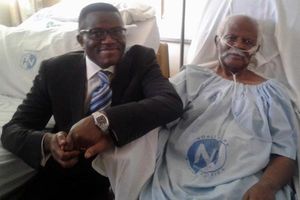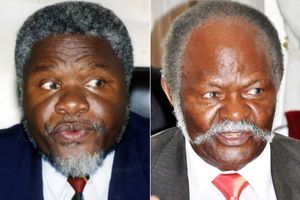
Former director for research at the Movement Secretariat, Chango Macho w’Obanda. Photo/File
Twenty nine years ago on July 1, the director for research at the Movement Secretariat, Chango Macho w’Obanda, criticised President Museveni and Finance minister Joash Mayanja Nkangi for allegedly being proud of the Structural Adjustments Programmes (SAPs) that were being implemented at the behest of the International Monetary Fund (IMF).
Chango Macho made the attack on July 1, 1995, during a one-day seminar held at the International Conference Centre (now Kampala Serena Hotel).
The seminar, which targeted permanent secretaries, directors and commissioners in government departments, was organised by the Uganda Investment Authority (UIA).
The attack was precipitated by comments made by Nkangi and a speech that Trade and Industry minister Richard Kaijuka delivered on behalf of President Museveni.
The Wednesday Monitor of July 5, 1995, reported that Nkangi had joined President Museveni in condemning permanent secretaries and managers of commercial banks for allegedly frustrating investors.
“I’m talking with a lot of emotion, because it takes months for investors’ papers to be rejected or okayed by permanent secretaries and other public servants in positions of authority. These investors stay at the Sheraton and spend a lot of money as they wait for their papers to be worked on. This must stop,” the minister warned.
The minister revealed that he knew of an investor who had spent over Shs11 million in additional outflows, but was denied electricity by the Uganda Electricity Board (UEB), which made it impossible for him to start operating.
UEB was unbundled as part of the implementation of the provisions of the Public Enterprises Reform and Divestiture Act, 1993. Successor companies, namely the Uganda Electricity Generation Company Limited (UEGCL), Uganda Electricity Distribution Company Limited (UEDCL), Uganda Electricity Transmission Company Limited (UETCL) and Rural Electrification Agency (REA), under the Ministry of Energy and Mineral Development, were formed in accordance with the provisions of the Electricity Act, 1999.
The seminar intended to revitalise government policy on liberalisation, privatisation and investment promotion, also featured feisty Trade minister Kaijuka saying government had lost focus of trading goods in the global market.
“Uganda has no tradeable goods. Our industries are ramshackle, and generally we aren’t serious players in the global market,” he said. He called on government to promote commercial farming because the country enjoys comparative advantage in that sector.

President Museveni. Photo/File
In a speech read for him by Mr Kaijuka, President Museveni said for a change in investment to take place, government executives and agencies must see their role as facilitators, and not regulators, and undergo behavioural change while in public offices.
“The common practise of officials not handling investors’ enquiries speedily is unacceptable... Another practice that is counterproductive is that of ‘lost files’. Why should a file get lost?” Museveni wondered.
The President outlined the steps government had taken to win investors. They included political stability, liberalising the economy, building the infrastructure and establishing the UIA.
The Monitor of July 5, 1995, reported that UIA had by then, during the course of the financial year 1994/1995, handed out investment licenses to at least 1,334 investors with a projected investment of $5,126.6 million.
Criticism
What should have been ordinarily impressive figures and credentials in terms of attracting investors was, however, quickly shot by Chango Macho.
He criticised the President and Nkangi’s speeches for being proud of Structural Adjustments Programmes (SAPs).
SAPs are sets of economic reforms that the International Monetary Fund (IMF) and the World Bank often require crisis-stricken poor countries to introduce as a prerequisite to accessing loans from the two institutions.
The range of reforms that have been forced on poor countries include, among others, easing regulations as a way of attracting foreign investment; privatisation of State-owned enterprises and deregulation of State-controlled industries; easing regulations in order to attract investment by foreign businesses; devaluation of currencies to reduce balance of payments deficits; drastic reduction of public sector employment; scrapping of subsidies and; enforcing other spending to reduce budget deficits.
They are normally premised on the belief that they make the implementing nations more competitive and in the process lead to economic growth.
Reforms
It should be remembered that the National Resistance Movement government, working at the behest of the IMF, had announced a major restructuring of the economy in May 1987. The reforms included the currency reform, devaluation of the shilling and a hike in interest rates.
Government introduced a new currency under what was termed as the currency reform and exchange programme that also saw the value of the shilling reduced by 30 percent. Two zeros were also cut off the value exchange.
Ugandans surrendered currency notes from the Milton Obote II era and received new notes, with the biggest currency note being Shs100. The exercise also saw coins of Shs1, 2 and 5 introduced along with Shs50 cent coins.
Chango Macho argued that research findings contained in what was a new book at the time, Adjusting Privatisation which was authored by Christopher Adam, William Canavdish & Percy S. Misty, showed that SAPs only succeed in dictatorships and not under fully fledged democracies.
Whereas Uganda had by then held elections to the National Resistance Council in 1992 and the Constituent Assembly (CA) in March 1994, it was not a democracy in the real sense of the word, which raises questions about the kind of democratic credentials that Chango Macho was alluding to when he mentioned democracy and Uganda in the same line.

Former Finance Minister Joash Mayanja Nkangi. PHOTO/ FILE
The exchange
However, minister Nkangi did not take the criticism lying down. He shot back and challenged Chango Macho to stop mixing ideological issues with proven economic successes.
“SAPs have developed Uganda from zero percent growth in 1985 to 10 percent to date, and I’m not convinced that Uganda is a dictatorship. There is no empirical evidence to support you Mr Chango. My advice is that you shouldn’t mix ideological issues with economic issues,” Nkangi shot back.
Chango Macho was not done though. He interrupted minister Nkangi, reminding him that not much had been realised as a result of liberation of the economy.
“What is the economic benefit of liberalising the economy and importing second-hand clothes at the expense of Nytil?” he asked.
Nytil (Nyanza Textiles Limited) was a government-owned parastatal that had been heavily involved the processing of cotton, ginning and production of textiles. Nyanza Textile, closed down in 1992 under privatisation.
The firm was eventually privatised and renamed Nytil-Picfare before resuming production in 1996, a year after Chango Macho and Nkangi traded barbs. It has since been renamed Southern Range Nyanza Limited.
However, back on that day at the International Conference Centre, Nkangi lashed out at Chango Macho, saying the book he was waving at the seminar had cases studies from only Jamaica, Trinidad, Malaysia, Sri Lanka, Kenya, Papua New Guinea, Malawi and Tobago.
Chango Macho was not done though, telling Nkangi that the book considered global factors that undermine or favour SAPs, given the fact that most developing countries are bedevilled by similar political, economic and social factors.
Chango Macho, a former minister whose last government position was that of Special Presidential Advisor on Political Affairs, passed on in October 2013 at the age of 86.
Mayanja Nkangi, who later served as chairman of the Uganda Land Commission, passed on in March 2017 at the age of 84 years.
About Structural Adjustments Programmes:
SAPs are sets of economic reforms that the International Monetary Fund (IMF) and the World Bank often require crisis-stricken poor countries to introduce as a prerequisite to accessing loans from the two institutions.
The range of reforms that have been forced on poor countries include, among others, easing regulations as a way of attracting foreign investment; privatisation of State-owned enterprises and deregulation of State-controlled industries; easing regulations in order to attract investment by foreign businesses; devaluation of currencies to reduce balance of payments deficits; drastic reduction of public sector employment; scrapping of subsidies and; enforcing other spending to reduce budget deficits.



